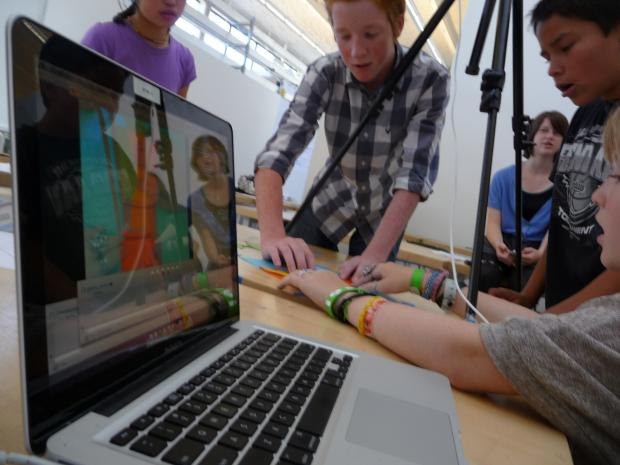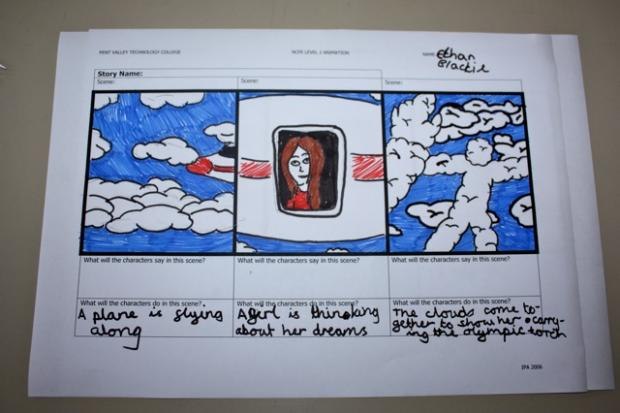International animation collage film “Driving Inspiration” honors the message of the Paralympics, bringing contributing students' hard work to an international stage.
Thanks to a starting sprint in Wales that included the Eleventh Doctor, Matt Smith, the lead-up to this year's Olympic and Paralympic Games in London is well on its way. The accompanying visual spectacle is just as expected as the record-breaking feats of athleticism, and the Paralympics will be no exception. Born from an international effort befitting the spirit of the Games, the film project known as Driving Inspiration will have its debut at the Olympic and Paralympic Games this summer. Incorporating material from students in locations as diverse as Italy, Israel, Bosnia, Turkey and Germany, among others, Driving Inspiration tells the story of the Paralympic Games and the personal journeys of its disabled athletes.
Contributions to the film include elements of dance, theatre, visuals, creative writing and music, communicated through animation. As told to AWN by Gary Schwartz, the project's Animation Consultant/Advisor, Driving Inspiration is about "inspiring young disabled and non-disabled people to identify and fulfill their own dreams, and to celebrate diversity." In maintaining the core values of the project, all of the artists and animators involved are themselves disabled. As explained by producer Vicky Hope-Walker, “This may be a physical disability like a spinal injury, or it might be a learning disability like Dyslexia, or Aspergers.” Hope-Walker told me that this choice was not only to uphold the central spirit of the games, but to present students at participating schools with examples of successful, disabled professionals who have still achieved their goals.
Driving Inspiration came about through a chance meeting in 2007 between Hope-Walker, who is a freelance arts projects producer, and Martin McElhatton, retired Paralympian and CEO of WheelPower, UK. Hope-Walker has long had an interest in pursuing projects that focus on young people and new media, and was inspired by McElhatton’s work. The two have since collaborated on numerous endeavors in visual art, dance, music and film with thousands of young people. In 2012, Hope-Walker says, “we decided to raise the stakes and do something more ambitious involving [young people across] the globe, with a focus on animation and live online lessons.”
“The key aim of Driving Inspiration was originally to raise awareness of the Paralympic movement through contact with Paralympians and disabled artists. But it soon became clear that in doing so we were providing young people, both disabled and non-disabled, in poverty and in wealth, with wonderful role models for life, and making them think about diversity and equality in a new way,” Hope-Walker explained.
The project was soon on its feet, picking up sponsorship from Accentuate, a funding arm of London 2012 for the Olympic and Paralympic Cultural Olympiad, Arts Council Great Britain, and the Buckinghamshire County Council. Hope-Walker brought frequent collaborator David Bunting on board as director. Schwartz, an Oscar-nominated animator and educator, joined the team after seeing an advertisement from Hope-Walker and Bunting, eager to lend his experience and avant-garde approach to the unconventional project.
Participating schools include 10 sites across the UK, and additional sites in France, Germany, Italy, Bosnia, Uganda, Turkey, Singapore, Israel, Brazil, Nepal, and the USA, totaling 23 sites in all. The students involved in Driving Inspiration are an all ages mix, ranging from as young as 5 up to 18-year-olds helping out at some sites. Divided into 10 sections, the unifying concept for Driving Inspiration is the Olympic Torch. Students from each of the schools were asked to create storyboards around the Olympic relay race, a fitting analogy for production pipeline, and for the exquisite corpse appearance of the finished product.
Technology has played a key role in making the international project a reality. Bunting, along with Schwartz, used Skype and Adobe Connect to run two live online workshops at each of the overseas schools. As Hope-Walker explained, this included an initial lesson about the Paralympics, their history, and the values the Games represent; Determination, Inspiration, Courage, and Equality. Teachers at the overseas sites worked with the students, uploading finished drawings, storyboard ideas, film, and photographs to a Dropbox, where they were retrieved and developed by pupils in the UK. The UK and overseas students then conversed live online about the final ideas for the film, ensuring that all parties were happy and that there was, in Hope-Walker’s words, “no cultural misinterpretation.” Final films were then made and assembled in to one massive collage of a film, what Schwartz exuberantly calls an “anijam.”
The inspiring nature of the work encompassed not only the students involved, but amazed the teachers and production team, opening up a dialogue across continents. Susan Hay, teacher at the Queen Elizabeth II School in Horsham, UK, found herself confessing to the principal of School Murat Akta, in Ankara, Turkey that her staff was surprised by the amount of work the students were able to do in such a short period of time, and that the parents that saw the work were impressed. Michelle Grande Berck, teaching in France, thanked Hope-Walker via e-mail for making Driving Inspiration possible, and stating that, “the students were really impressed by the work of their counterparts.”
"This was an ambitious project,” Hope-Walker shared, pointing out not everything has been smooth sailing; for instance, the technology that was essential has also been unreliable. International and local conflicts have also played their part. “We have had delays due to bombings, teachers on strike (but very apologetic) because they have not been paid for months, and [in one place] the internet going down for over 1 month.” But, she counters, “the excitement from all over the world [allowed us to] brush aside such problems and [find] ways around them.”
Hope-Walker noted, “I have been struck by the similarities between young people in the way they think and [in the] crossing over of ideas. It has opened everyone’s eyes to both similarities and differences. We have had young people from wealth, poverty, and disability. Children who have never heard of the Paralympics, and have been amazed at the idea that a disabled/disadvantaged person can be so successful. We have had the most beautiful drawings from a girl who up until a few months ago had never been to school, working as a dishwasher until the age of 10!” She went on to say how inspired she was at seeing schools incorporate the Paralympic values into their everyday routines, and into their policies about who can have access to schooling.
According to Hope-Walker, the massive collaborative effort will have its debut as part of the Olympic relay on July 9th, as well as the Paralympic Torch relay that will follow the closing of the Olympic Games. Following the relay, it will be part of an exhibition at the Stoke Mandeville, the birthplace of the Paralympics, and will "likely" be in the Paralympic Suite at the main stadium during the 2012 Paralympic Games, not to mention showing up on the BBC's big screens. Schwartz and Hope-Walker hope to line up a solid run for the project after its high-profile introduction, at festivals and venues throughout the world. Ultimately, Schwartz says, his hopes for Driving Inspiration are to have as many eyes on the production as possible, promoting awareness of disabilities "in the public consciousness through the international language of animation."
Thanks to Vicky Hope-Walker, David Bunting, and Gary Schwartz for offering their insights to AWN, and for their hard work on this international production. To learn more about the Paralympics and Driving Inspiration, visit Mandeville Legacy’s site: http://www.mandevillelegacy.org.uk/category_id__23_path__0p5p.aspx












